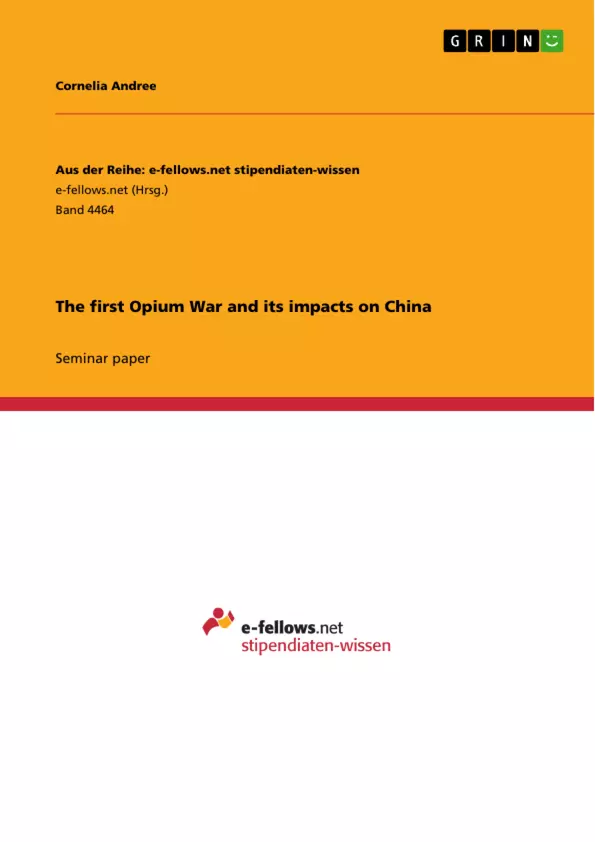Before 1839, China was closed for Western trader. The only Chinese port, where highly controlled trade between Western merchants and the governmental ap-pointed merchants “Gong Hang” was allowed, was Canton (Guangzhou). Western merchants had to life in separated districts of Canton, could not stay there more than a few months and were prohibited to bring their families or to have contact with Chinese except in trade. Furthermore, Western traders could not contact Chi-nese officials directly and there were no formal diplomatic relations between Chi-na and Western countries. Why did China seal off itself from Western trade so extremely?
Inhaltsverzeichnis (Table of Contents)
- 1 The closed and trade adverse China before 1839
- 2 Unbalanced trade and the Opium Smuggling
- 3 Commissioner Lin and the Outbreak of War
- 4 The Treaty of Nanking and the aftermaths of the war
- 4.1 Economical impacts
- 4.2 Social and ideological impacts
- 4.3 Political impacts
- 5 Conclusion
Zielsetzung und Themenschwerpunkte (Objectives and Key Themes)
This essay examines the First Opium War (1839-1842) and its multifaceted impacts on China. It explores the historical context that led to the conflict, focusing on China's closed-door policy and the escalating trade imbalance between China and Britain. The essay then delves into the outbreak of war, examining the role of Commissioner Lin and the consequences of the war, including the Treaty of Nanking and its long-term economic, social, ideological, and political implications for China.
- China's closed-door policy and its underlying motivations
- The escalating trade imbalance between China and Britain
- The role of opium smuggling in the conflict
- The Treaty of Nanking and its consequences for China
- The economic, social, ideological, and political impacts of the First Opium War
Zusammenfassung der Kapitel (Chapter Summaries)
- Chapter 1: The closed and trade adverse China before 1839: This chapter examines China's closed-door policy towards Western trade in the years preceding the First Opium War. It explores the reasons behind this policy, highlighting China's sense of supremacy, its desire to avoid colonization, and its reliance on a self-sufficient domestic economy.
- Chapter 2: Unbalanced trade and the Opium Smuggling: This chapter focuses on the trade imbalance between China and Britain, which led to a significant drain of silver from China. It examines the role of opium smuggling in attempting to rectify this imbalance and the consequences of this illegal trade on China's society.
- Chapter 3: Commissioner Lin and the Outbreak of War: This chapter explores the events leading to the outbreak of the First Opium War, focusing on the actions of Commissioner Lin and the British response to his efforts to suppress the opium trade.
- Chapter 4: The Treaty of Nanking and the aftermaths of the war: This chapter examines the Treaty of Nanking, which ended the First Opium War. It analyzes the treaty's terms and its long-term impacts on China's economy, society, ideology, and politics.
Schlüsselwörter (Keywords)
The First Opium War, China, British Empire, Opium Trade, Treaty of Nanking, closed-door policy, trade imbalance, colonization, economic impacts, social impacts, ideological impacts, political impacts.
- Quote paper
- Cornelia Andree (Author), 2012, The first Opium War and its impacts on China, Munich, GRIN Verlag, https://www.hausarbeiten.de/document/210026


